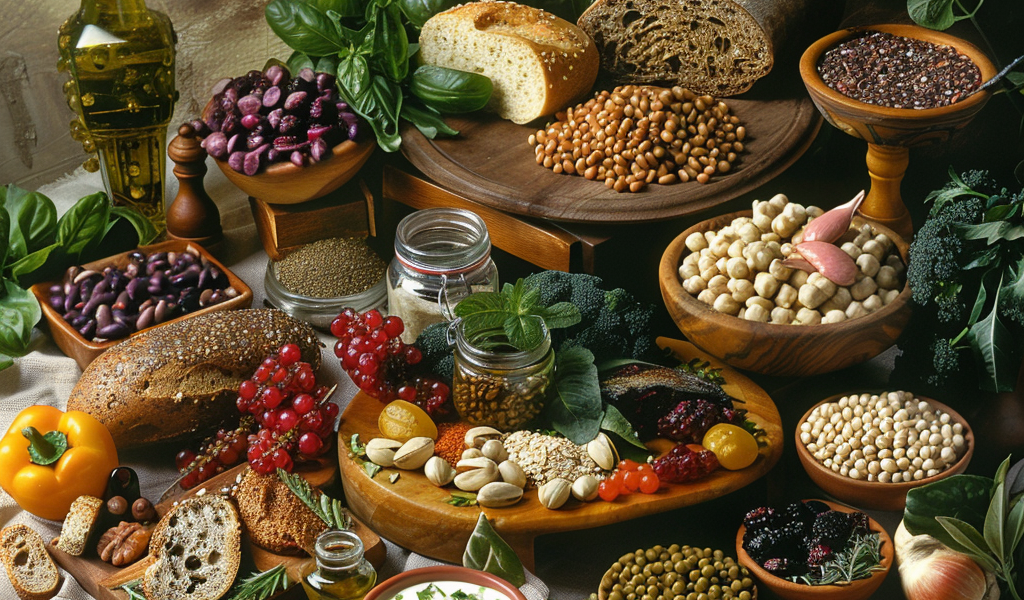Centenarians, individuals who reach the remarkable milestone of 100 years or more, have intrigued researchers globally, particularly in relation to their dietary habits. Many of these long-lived individuals reside in regions known as Blue Zones, which include areas such as Loma Linda, California; Nicoya, Costa Rica; Sardinia, Italy; Ikaria, Greece; and Okinawa, Japan. Studies have shown that the diets of these populations play a crucial role in their longevity and overall health.
Research has highlighted a variety of nutrient-dense foods that are commonly consumed by centenarians, which contribute to their health and longevity. Here are ten key foods that are staples in the diets of those who live to a ripe old age:
1. Beans
Beans and legumes are fundamental components of the Blue Zone diet. These foods are packed with protein, fiber, vitamins, and minerals, making them a powerhouse for nutrition. One of the significant benefits of beans is their low glycemic index (GI), which means they do not cause rapid spikes in blood sugar levels. Instead, they provide a steady release of energy, helping to maintain satiety and manage weight.
Furthermore, beans are beneficial for heart and digestive health. They are high in soluble fiber, which aids in digestion and supports gut health by fostering beneficial bacteria. This fiber also helps lower cholesterol levels, thus promoting cardiovascular health. Additionally, the antioxidants found in beans combat oxidative stress, which is linked to chronic diseases.
2. Leafy Greens
Leafy greens such as spinach, kale, and Swiss chard are another critical aspect of the diets of centenarians. These vegetables are rich in essential vitamins and minerals, and numerous studies have connected their consumption with reduced inflammation, enhanced immunity, and improved heart health.
Incorporating leafy greens into a balanced diet can also support cognitive function. They contain powerful antioxidants and brain-protective compounds like lutein, folate, and beta-carotene, which are believed to slow cognitive decline as one ages.
3. Nuts and Seeds
Nuts, including walnuts, almonds, and pistachios, are frequently consumed by those living in Blue Zones. These nutrient-dense foods are rich in healthy fats, protein, and fiber, as well as a variety of vitamins and minerals. Nuts are known for their antioxidant and anti-inflammatory properties, which contribute to improved heart health by lowering cholesterol and blood pressure.
Seeds, such as chia seeds and flaxseeds, offer similar health benefits and are an excellent addition to a diet focused on longevity.
4. Whole Grains
Whole grains are another staple in the diets of centenarians. Foods such as brown rice, quinoa, and whole wheat bread are excellent sources of complex carbohydrates, fiber, and essential nutrients. Consuming whole grains can improve digestive health, support heart health, and help maintain stable blood sugar levels.
These grains also provide sustained energy, making them an essential part of a balanced diet for those looking to improve their overall health and longevity.
5. Fruits
Fruits, particularly those that are rich in antioxidants, play a vital role in the diets of centenarians. Berries, apples, and citrus fruits are often favored for their high vitamin content and health benefits. These fruits help combat oxidative stress and inflammation, which are significant contributors to aging and chronic diseases.
Incorporating a variety of fruits into daily meals can enhance overall health and provide essential nutrients that support longevity.
6. Fish
Fish is a common source of protein among centenarians, especially fatty fish like salmon and sardines, which are rich in omega-3 fatty acids. These healthy fats are known for their anti-inflammatory properties and benefits for heart and brain health.
Consuming fish regularly can contribute to a lower risk of chronic diseases, making it a smart dietary choice for those aiming to live a long and healthy life.
7. Fermented Foods
Fermented foods such as yogurt, kimchi, and sauerkraut are prevalent in the diets of many centenarians. These foods are rich in probiotics, which are beneficial for gut health. A healthy gut microbiome is linked to improved digestion, enhanced immunity, and even better mental health.
Incorporating fermented foods into the diet can support overall well-being and longevity.
8. Olive Oil
Olive oil is a cornerstone of the Mediterranean diet, which is often followed by centenarians in regions like Sardinia and Ikaria. This healthy fat is rich in monounsaturated fats and antioxidants, making it an excellent choice for heart health.
Using olive oil as a primary fat source can help reduce inflammation and lower the risk of chronic diseases, contributing to a longer, healthier life.
9. Herbs and Spices
Herbs and spices are not only used for flavoring but also offer numerous health benefits. Many centenarians use a variety of herbs such as garlic, turmeric, and ginger, which are known for their anti-inflammatory and antioxidant properties.
Incorporating a range of herbs and spices into meals can enhance flavor while providing additional health benefits that support longevity.
10. Dark Chocolate
Dark chocolate, particularly varieties with high cocoa content, is enjoyed by some centenarians as a treat. Rich in antioxidants, dark chocolate has been linked to various health benefits, including improved heart health and reduced inflammation.
In moderation, dark chocolate can be a delightful addition to a healthy diet, contributing to overall well-being.
In summary, the dietary habits of centenarians provide valuable insights into the foods that promote longevity and health. By incorporating these nutrient-rich foods into daily meals, individuals can take steps toward improving their health and potentially increasing their lifespan.





